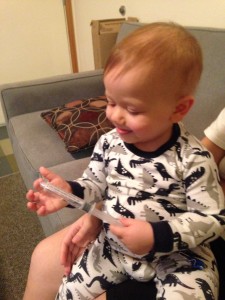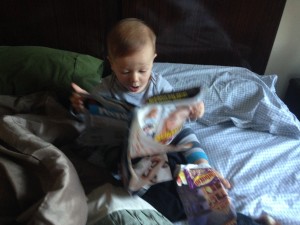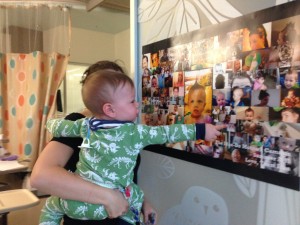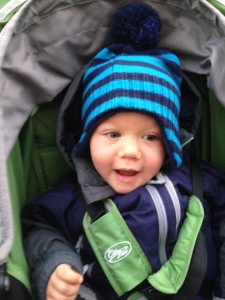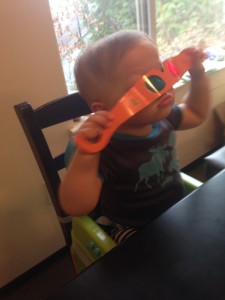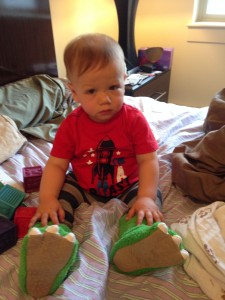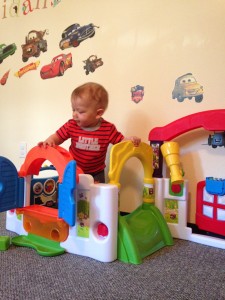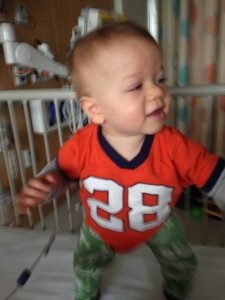Technology has filled potentially fatal gaps in the U.S. healthcare system by providing families with the opportunity to ‘crowd fund’ their medical bills.
STEVE CANNANE, PRESENTER: It gives a new meaning to the phrase “the kindness of strangers”. Potentially fatal gaps in the American health care system are being filled by crowdsourcing, where families use the Internet to attract donations to pay their medical bills.
North America correspondent Jane Cowan reports.
JANE COWAN, REPORTER: At first glance it is a normal childhood scene, but this small Manhattan apartment is one year-old Adan’s world and meal times are a high point in his day. Because of a rare immune disorder, he is effectively forced to live in a bubble.
AMANDA ZABLOCKI, MOTHER: He has a very, very rare immune deficiency disorder which affects his ability to fight off even the most common funguses and infections and bacteria.
JANE COWAN: The diagnosis has been a blow to the young family, Adan’s father himself a brain tumour survivor.
AKIVA ZABLOCKI, FATHER: I would say our life has changed, you know, 180.
The first thing they told us when they finalised the diagnosis is that he can’t be in day care, he can’t be around any other kids, which meant I had to be at home with him full-time.
JANE COWAN: But the shock of the diagnosis was magnified by the financial burden of the treatment.
AKIVA ZABLOCKI: Like, in the second out of hospital, we got a denial letter from the insurance that said that the drug he needs, the antibody replacement therapy, was not covered.
AMANDA ZABLOCKI: It’s kind of the feeling of being kicked while you’re down. It’s kind of like, that’s the last thing you ever want to be thinking about when you’re thinking about the wellbeing and health of your son.
JANE COWAN: For help, the couple turned online to one of an increasing number of websites where people can profile their medical conditions and seek donations to help pay their medical bills. They’ve raised more than $200,000 for a bone marrow transplant.
AMANDA ZABLOCKI: It has been incredible. I mean, within the first two weeks we raised $40,000.
MICHAEL BLASCO, YOUCARING: This is a clear case of when social media’s actually a good thing. It allows you to share things with people you know and that you don’t know and, as it’s shared again and again, your story gets spread across the globe and suddenly, when you thought you had no hope and nowhere to turn.
WEB ADVERTISEMENT: Simply sign up and create your youcaring.com online donation page…
JANE COWAN: Crowd funding has been used to finance films and business ventures but Michael Blasco from the website youcaring says more and more it’s being used to fund life-saving medical care.
MICHAEL BLASCO: The Boston bombing, the tornadoes in Oklahoma. Youcaring started 20 months ago and has raised over $20 million. We’ve had over 40,000 fundraisers. Right now we have 14,000 active fundraisers on the site.
JANE COWAN: Tova Ross was raising her own young son in New Jersey when she heard about Adan’s story.
TOVA ROSS, DONOR: I saw a Facebook post about them by a mutual friend of ours and I just felt compelled to reach out.
JANE COWAN: Crowd funding has not only been a source of financial support but social connection.
TOVA ROSS: It’s funny ’cause we kind of… you know, we have some mutual friends here and there but I doubt we ever would have met or come into contact and so… Manhattan’s kind of worlds away from New Jersey in a sense and so this is really a way that brought us together.
DONATION BENEFICIARY, YOUCARING.COM: I just want to tell you thank you so much for contributing…
JANE COWAN: But those in health care policy worry crowd funding could be letting America’s health care system off the hook.
DONATION BENEFICIARY 2, YOUCARING.COM: … healing his brain and providing…
SABRINA MCCORMICK, SOCIOLOGIST, GW UNIVERSITY: These platforms are wonderful in the sense that they are so empowering for individuals. On the other hand, what it does is to allow people to, individuals to rely on individual citizens to pay for their healthcare in situations where, actually, our government should be stepping in and supporting them.
JANE COWAN: Adan has just had his bone marrow transplant, beginning the long road to recovery and, hopefully, a complete cure. It’s meant a move to Seattle and a lengthy stay in hospital, during which the family has had no income. But they can finally see some light at the end of the tunnel.
AKIVA ZABLOCKI: We’re lucky that he is still young and that, hopefully in a year from now, he won’t remember any of this and he won’t know why his parents so fuss about him so much. And why there is so much… so many people in the world that know who he is, I guess.
(joking with son:) Is this how we behave in a hospital?
JANE COWAN: Do-it-yourself health care in a country where millions of people still don’t have access to proper treatment.
Jane Cowan, Lateline.
